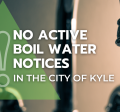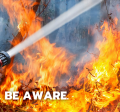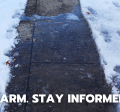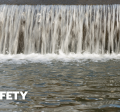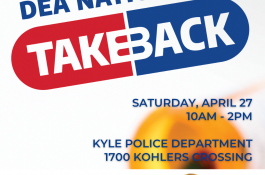Emergency Alerts & Preparedness
The City of Kyle is committed to keeping the community safe, especially during an emergency or disaster. As a resident, you are an important part of emergency planning and preparedness. Learn how to prepare before and stay safe during and after a disaster.
Sign up to receive accurate and timely local alerts.
Be among the first to receive critical information about emergencies and community alerts regarding natural and man-made disasters.
The City of Kyle participates in WarnCentralTexas, a program promoting voluntary registrations for the regional notification system (RNS) used by the Capital Area Council of Governments and its regional, government partners in Bastrop, Blanco, Burnet, Caldwell, Fayette, Hays, Lee, Llano, Travis and Williamson counties.
The RNS program is powered by Everbridge, which allows local officials to contact people in their communities by cellphone, email, text or mobile app during times of disasters or public safety events. The City of Kyle may occasionally use the RNS for important messages.
The WarnCentralTexas.org system uses phone numbers from subscribers to create a user friendly, internet-based interface to place calls quickly and efficiently in cases of emergencies, including severe weather events. The system can also be used to deliver other important public service announcements to citizens.
By registering you will automatically be enrolled to receive emergency notifications, but you can also opt-in to weather and community notifications.
Kyle residents can also access the system to enter other phone numbers, for example a cell or work phone.
Everbridge is an entirely internet-based system and has redundant servers across the country. This ensures the system will be available and can be activated from anywhere with an Internet connection. In the event that an Internet connection is unavailable, the system can be activated by phone if necessary.
Make a communication plan and a disaster plan for your family
The first step in being prepared for an emergency is making an emergency plan. Talk with your family and make sure everyone knows what to do during an emergency.
- Where and how to exit your home safely (doors, windows, and stairways). Know two (2) ways out
- A location outside your home where you will meet
- The location of your emergency kit
- The name of a person outside the area who can act as your family’s point of contact if you get separated at any time. Make sure everyone knows the person’s name, address, and telephone number
- A list of important telephone numbers and addresses
- The emergency plan at your children’s school / childcare center / or day program facility
- A plan for your family in the event you are separated – who could your children call for help or for information?
Create an emergency supply kit
After an emergency, you may need to survive on your own for several days. Being prepared means having your own food, water and other supplies to last for several days. A disaster supplies kit is a collection of basic items your household may need in the event of an emergency.
- Water (one gallon per person per day for several days, for drinking and sanitation)
- Food (at least a three-day supply of non-perishable food)
- Battery-powered or hand crank radio and a NOAA Weather Radio with tone alert
- Flashlight
- First aid kit
- Extra batteries
- Prescription & non-prescription medications (pain relievers, anti-diarrhea medication, antacids, laxatives, etc.)
- Infant formula, bottles, diapers, wipes and diaper rash cream
- Pet food and supplies
For more emergency preparedness tips, visit Ready.Gov/Plan.
State of Texas Emergency Assistance Registry
Do you or anyone you know need some assistance during times of an emergency event? The state of Texas presents the STEAR program. The STEAR program is a free registry that provides local emergency planners and emergency responders with additional information on the needs in their community.
Who Should Register?
- People with disabilities
- People who are medically fragile
- People with access and functional needs such as:
- People who have limited mobility
- People who have communication barriers
- People who require additional medical assistance during an emergency event
- People who require transportation assistance
- People who require personal care assistance
Texas communities use the registry information in different ways. Registering yourself in the STEAR registry DOES NOT guarantee that you will receive a specific service during an emergency. Available services will vary by community.
To learn more and register for the STEAR Program Click Here.

